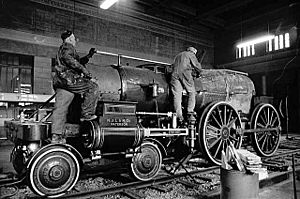Swinburne, Smith and Company facts for kids
Swinburne, Smith and Company was an important company that built locomotives (train engines) in the mid-1800s. It was started in 1845 in Paterson, New Jersey, by two partners, William Swinburne and Samuel Smith. Both men had a lot of experience building train parts at another big company called Rogers, Ketchum and Grosvenor. William Swinburne used to make patterns for parts, and Samuel Smith was in charge of making molds.
Building Early Locomotives
Swinburne, Smith and Company quickly started building engines for some of the biggest railroad companies of their time. Their very first major customer was the Erie Railway. They also built locomotives for other important lines like the Delaware, Lackawanna and Western Railroad and the Chicago and Alton Railroad.

A New Name: New Jersey Locomotive and Machine Company
Swinburne, Smith and Company was only in business for about ten years. They faced tough times during a period called the Panic of 1857, which was a big economic downturn. Because of this, the company had to reorganize. A new partner, James Jackson, joined, and the company changed its name to the New Jersey Locomotive and Machine Company. John Brandt became the main engineer and superintendent, overseeing the design of their new engines.
One of the most famous locomotives built by this company is the William Crooks. This engine was made for the Great Northern Railway and is special because it's the only locomotive still around today that was built by this company. You can see it at the Lake Superior Railroad Museum.
Becoming Grant Locomotive Works
The New Jersey Locomotive and Machine Company also ran into money troubles in 1863. A banker named David B. Grant took over the company. He decided to change its name one last time, and it became known as Grant Locomotive Works.

